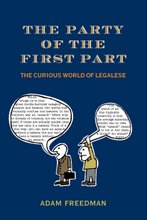
Usufruct
The right to use and to enjoy the profits of property that belongs to another. If somebody gives you usufruct over land, you can live on it, grow crops on it, and eat or sell those crops. But you cannot sell it.
Usufruct is a Roman legal concept; the word comes from Latin usus (use) plus fructus (fruit), thus conveying the concept of property you can use and enjoy the fruits of, but still isn't yours. From Roman law, usufruct entered the French Civil Code, and from France was transplanted to the Louisiana Civil Code, where it remains today, defined in Section 535.
In A Streetcar Named Desire, Stanley tells Stella that the Napoleonic Code means that "what belongs to the wife belongs to the husband also, and vice versa." Sorry Stanley. Actually, Louisiana law gives the surviving spouse usufruct over the marital property -- but not ownership. Maybe usufruct was too much of a mouthful for poor Stanley.


6 comments:
Stanley was wrong on another count. The Napoleonic Code originated after the Louisiana Purchase. Our Civil Code shares the same root as the Napoleonic Code, but did not evolve from the Napoleonic Code.
Stanley was thinking of community property, a feature of Louisiana law inherited from Spain. Under a community-property regime, property acquired during the marriage is presumed community property. But Stanley was mistaken in thinking that he had any ownership in Stella's inheritance. Under the Louisiana Civil Code, her inheritance would have been her separate property.
I'd be very, very careful pronouncing that word in court. A lot has been written about how "big words" don't impress -- this one has the potential to offend with a small mispronunciation by the speaker or a slight hearing impairment in the listener!
Ray, thanks for the info. And Greg - sound advice as ever. Reminds me of the person who said that "pendente lite" had great taste, but was less filling.
Here's one I bet you all know nothing about. In French and Spanish and Portuguese, usufruct is also called joussance, goce and gozo respectively. Which is also enjoyment. The French psychoanalyst Jacques Lacan, who gained a reputation for recondite language (though in fact it really isn't)borrowed the idea to explain certain situations where people get off situations unconsciously..Today, that concept among Lacanians is referred to even in English texts as jouissance, because the harsh sounding usufruct just didn't cut it....Incredibly, in every day langauge, we say "to get off on something" which is exactly what jouissance means psychoanalytically. Now, isn't that fun? Qu'est qui vous fait jouir? [translation: What do you get off on]. In fact, if you enjoy possession of a property - usufruct - you are in fact getting off on it. And without paying for it....
Jane, that's formidable, as they say in France. (apologies for the delay I was on vacation last week.. .)
kyrie 4
balenciaga triple s
yeezy boost 350
longchamp handbags
off white nike
yeezy boost
nike off white
lebron 15
curry 6
supreme shirt
Post a Comment